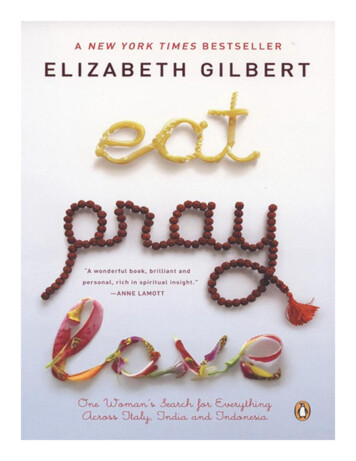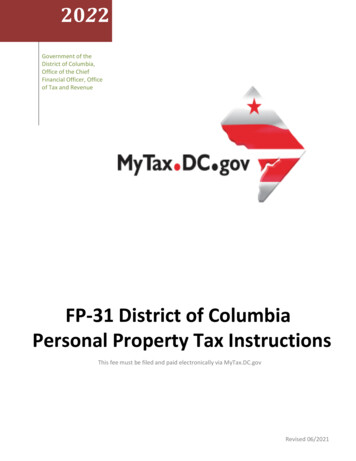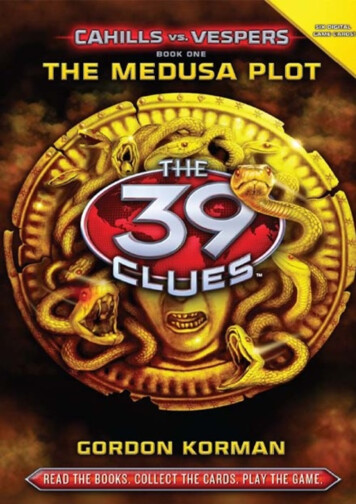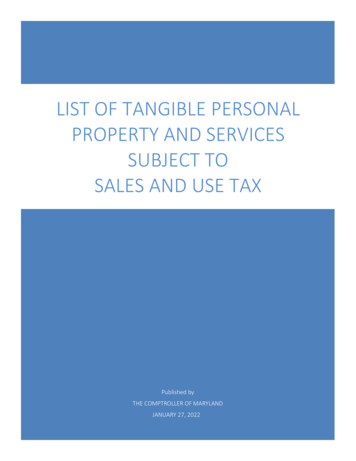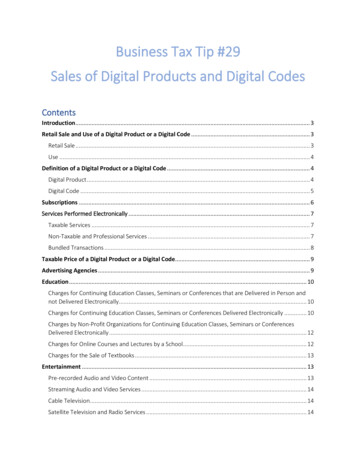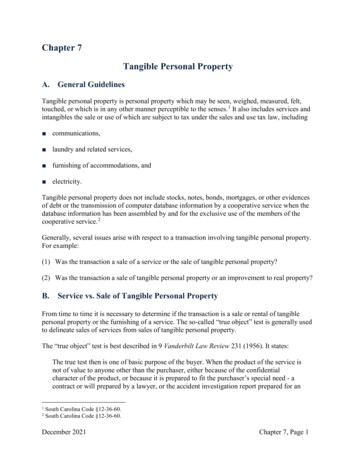
Transcription
Chapter 7Tangible Personal PropertyA. General GuidelinesTangible personal property is personal property which may be seen, weighed, measured, felt,touched, or which is in any other manner perceptible to the senses. 1 It also includes services andintangibles the sale or use of which are subject to tax under the sales and use tax law, including communications, laundry and related services, furnishing of accommodations, and electricity.Tangible personal property does not include stocks, notes, bonds, mortgages, or other evidencesof debt or the transmission of computer database information by a cooperative service when thedatabase information has been assembled by and for the exclusive use of the members of thecooperative service. 2Generally, several issues arise with respect to a transaction involving tangible personal property.For example:(1) Was the transaction a sale of a service or the sale of tangible personal property?(2) Was the transaction a sale of tangible personal property or an improvement to real property?B.Service vs. Sale of Tangible Personal PropertyFrom time to time it is necessary to determine if the transaction is a sale or rental of tangiblepersonal property or the furnishing of a service. The so-called “true object” test is generally usedto delineate sales of services from sales of tangible personal property.The “true object” test is best described in 9 Vanderbilt Law Review 231 (1956). It states:The true test then is one of basic purpose of the buyer. When the product of the service isnot of value to anyone other than the purchaser, either because of the confidentialcharacter of the product, or because it is prepared to fit the purchaser’s special need - acontract or will prepared by a lawyer, or the accident investigation report prepared for an12South Carolina Code §12-36-60.South Carolina Code §12-36-60.December 2021Chapter 7, Page 1
insurance company - this fact is evidence tending to show that the service is the realpurpose of the contract. When the purpose of a contract is to produce an article which isthe true object of the agreement, the final transfer of the product should be a sale,regardless of the fact that special skills and knowledge go into its production. Under thisanalysis, printing work, done on special order and of significant value only to theparticular customer, is still a sale. The purchaser is interested in the product of theservices of the printer, not in the services per se. Similarly, it would seem that contractsfor custom-produced articles, be they intrinsically valuable or not, should be classified assales when the product of the contract is transferred.The Vanderbilt Law Review article, in quoting Snite v. Department of Revenue, 398 Ill. 41, 74N.E.2d. 877 (1947), also establishes the following general rule:If the article sold has no value to the purchaser except as a result of services rendered bythe vendor, and the transfer of the article to the purchaser is an actual and necessary partof the services rendered, then the vendor is engaged in the business of rendering service,and not in the business of selling at retail. If the article sold is the substance of thetransaction and the service rendered is merely incidental to and an inseparable part of thetransfer to the purchaser of the article sold, then the vendor is engaged in the business ofselling at retail, and the tax which he pays.[is measured by the total cost of article andservices]. If the service rendered in connection with an article does not enhance its valueand there is a fixed or ascertainable relation between the value of the article and the valueof the service rendered in connection therewith, then the vendor is engaged in thebusiness of selling at retail, and also engaged in the business of furnishing service, and issubject to tax as to the one business and tax exempt as to the other.While the above quotes do not establish rigid rules, they do provide general guidance indetermining the purpose of a transaction, and are particularly helpful in addressing this issue.C. Examples of Persons Engaged in the Business of Selling TangiblePersonal Property at RetailWhile the products created by these persons may involve a certain amount of personal orprofessional service, the “true object” of the transaction is the sale of tangible personal property. Photographers 3 Artists 4 Sellers of Custom-Made Items 53SC Regulation 117-309.2 and Commission Decisions S-D-175 and S-D-148. See also SC Revenue Ruling #15-10for information on the application of the sales and use tax to photographs sold at retail by a photographer in tangibleform (e.g., traditional print form, CD, DVD, flash drive) and electronic form (e.g., email attachment or a downloadfrom the photographer’s website).4SC Regulation 117-309.4.5SC Regulation 117-309.5.December 2021Chapter 7, Page 2
Machine shops 6 Undertakers 7 Interior decorators 8 Sellers of Tax Map Sheets 9 Sellers of computer software, whether custom software or “canned” software 10 Caterers 11 Renters of tangible personal property, such as businesses that rent kayaks and paddleboards 12 Opticians 13For additional examples of persons engaged in selling tangible personal property at retail, see SCRegulation 117-308. However, it should be noted that in some of these examples, persons sellingtangible personal property at retail may also be providing a separate and distinct non-taxableservice that is not provided in conjunction with the sale of tangible personal property at retail.SC Regulation 117-309.6.SC Regulation 117-309.8.8SC Regulation 117-309.10.9Richland County v. South Carolina Tax Commission, Richland County Court of Common Pleas Case No. 82-CP40-2143 (1983).10Citizens and Southern Systems, Incorporated v. The South Carolina Tax Commission, 280 S.C. 138, 311 S.E.2d717 (1984), SC Regulation 117-330, South Carolina Revenue Ruling #12-1; South Carolina Revenue Ruling #11-2;South Carolina Revenue Ruling #03-5. Software must be delivered in tangible form, or sold as a communicationservice such as an Application Service Provider (“ASP”), in order for the transaction to constitute a sale of tangiblepersonal property subject to the tax. Software delivered electronically is not a sale of tangible personal property andtherefore not subject to the tax.11See Tronco’s Catering, Inc. v. South Carolina Department of Revenue, 09-ALJ-17-0089-CC (April 12, 2010) andHamby Catering, Inc. v. South Carolina Department of Revenue, 08-ALJ-17-0041-CC (June 12, 2009). See alsoSouth Carolina Revenue Ruling #12-3. This advisory opinion concerns fundraisers by nonprofit organizations.However, through several of the examples contained in it, this opinion also demonstrates the Department’slongstanding position that caterers are engaged in the business of selling tangible personal property at retail.12See SC Revenue Ruling #15-1. This revenue ruling also provides guidance with respect to businesses that rentkayaks and paddle boards and also conduct tours with the same kayaks and paddle boards and businesses that onlyconduct tours and do not rent kayaks and paddle boards.13SC Regulation 117-308.7; SC Revenue Ruling #21-14.67December 2021Chapter 7, Page 3
D. Examples of Persons Engaged in the Business of Selling a Non-TaxableService14These persons may provide their customers or clients with tangible personal property, such as adentist providing dental implants, a lawyer preparing and providing a contract or will, and anarchitect preparing and providing plans, but the “true object” of the transaction is theprofessional or personal service. The tangible personal property is incidental to the transaction.As such, these persons do not sell tangible personal property subject to the tax, but use andconsume tangible personal property such as the dental implant or paper for the contract, will orplans, in providing a non-taxable service. Dentists 15 Doctors 16 Lawyers 17 Veterinarians 18 Architects 19 Advertising agencies 20 Ophthalmologists and Optometrists 21For additional examples of persons engaged in providing a non-taxable service, see SCRegulation 117-308. However, it should be noted that in some of these examples, personsproviding a non-taxable service may also be selling tangible personal property.For purposes of this discussion, “non-taxable services” are services upon which the General Assembly has notspecifically imposed the sales and use tax.15SC Regulation 117-308.2.16SC Regulation 117-308.3. However, if a doctor has a stock of drugs from which he makes numerous andsubstantial retail sales, he is required to have a retail license and to remit sales tax directly to the Department.17SC Regulation 117-308.4.18South Carolina Code §12-36-110(1)(l) and SC Regulation 117-308.5.19SC Regulation 117-308.6. However, sales by architects of all reproductions of their plans, designs orspecifications, unaltered or unmodified in any way, are deemed to be subject to the sales or use tax.20SC Regulation 117-308.9.21SC Regulation 117-308.7; SC Revenue Ruling #21-14. However, ophthalmologists and optometrists who makenumerous and substantial sales of prescription eyeglasses to non-patients or sales of nonprescription eyewear (e.g.,sunglasses) must obtain a retail license and such sales are subject to sales or use tax.14December 2021Chapter 7, Page 4
E.Sale of Tangible Personal Property vs. Improvement to Real PropertyStatutes and RegulationsIn making the determination as to whether a person is a retailer making sales and installations ora contractor, the following provisions must be considered:South Carolina Code §12-36-910(A) imposes the sales tax and reads:A sales tax, equal to [six] percent of the gross proceeds of sales, is imposed upon everyperson engaged or continuing within this State in the business of selling tangible personalproperty at retail.South Carolina Code §12-36-1310(A) imposes the use tax and reads:A use tax is imposed on the storage, use, or other consumption in this State of tangiblepersonal property purchased at retail for storage, use, or other consumption in this State, atthe rate of [six] percent of the sales price of the property, regardless of whether the retailer isor is not engaged in business in this State.South Carolina Code §12-36-1340 concerns the collection of the use tax by the retailer, andstates:Each seller making retail sales of tangible personal property for storage, use, or otherconsumption in this State shall collect and remit the tax in accordance with this chapter andshall obtain from the department a retail license as provided in this chapter, if the retail seller:(1) maintains a place of business;(2) qualifies to do business;(3) solicits and receives purchases or orders by an agent, an independent contractor, arepresentative, an Internet website, or any other means;(4) distributes catalogs, or other advertising matter, and by reason of that distributionreceives and accepts orders from residents within the State;(5) operates as a marketplace facilitator; or(6) meets constitutional standards for economic nexus with South Carolina for purposes ofthe sales and use tax. 22The retailer can only be required to register and collect the use tax if the retailer has nexus with South Carolina.See Chapter 13 and SC Revenue Ruling #18-14 for information on nexus.22December 2021Chapter 7, Page 5
South Carolina Code §12-36-70 defines the term “retailer” and provides that a “retailer” includesevery person:(1)(a) selling or auctioning tangible personal property whether owned by the person or others;(b) furnishing accommodations to transients for a consideration, except an individualfurnishing accommodations of less than six sleeping rooms on the same premises,which is the individuals [sic] place of abode;(c) renting, leasing, or otherwise furnishing tangible personal property for a consideration;(d) operating a laundry, cleaning, dyeing, or pressing establishment for a consideration;(e) selling electric power or energy;(f) selling or furnishing the ways or means for the transmission of the voice or ofmessages between persons in this State for a consideration. A person engaged in thebusiness of selling or furnishing the ways or means for the transmission of the voice ormessages as used in this subitem (f) is not considered a processor or manufacturer;(2)(a) maintaining a place of business or qualifying to do business in this State; or(b) not maintaining an office or location in this State but soliciting business by direct orindirect representatives, manufacturers agents, distribution of catalogs, or otheradvertising matter or by any other means, and by reason thereof receives orders fortangible personal property or for storage, use, consumption, or distribution in this State.(3) operating as a marketplace facilitator, as defined in South Carolina Code §12-36-71. 23South Carolina Code §12-36-110 defines the term “retail sale” to mean in part:Sale at retail and retail sale mean all sales of tangible personal property except those definedas wholesale sales. The quantity or sales price of goods sold is immaterial in determining if asale is at retail.South Carolina Code §12-36-120 defines the term “wholesale sale,” in part, to mean:a sale of . . . tangible personal property to licensed retail merchants, jobbers, dealers, orwholesalers for resale, and do not include sales to users or consumers not for resale;The retailer can only be required to register and collect the use tax if the retailer has nexus with South Carolina.See Chapter 13 and SC Revenue Ruling #18-14 for information on nexus.23December 2021Chapter 7, Page 6
However, South Carolina Code §12-36-110(1) further defines the term “retail sale” to include, inpart:(a) sales of building materials 24 to construction contractors, builders, or landowners forresale or use in the form of real estate;***(d) the use within this State of tangible personal property by its manufacturer as buildingmaterials in the performance of a construction contract. The manufacturer must pay thesales tax based on the fair market value at the time and place where used or consumed;(e) sales to contractors for use in the performance of construction contracts;***Finally, SC Regulation 117-324, entitled “Dual Business,” states:Operators of businesses who are both making retail sales and withdrawing for use from thesame stock of goods are to purchase at wholesale all of the goods so sold or used and reportboth retail sales and withdrawals for use under the sales tax law.This ruling applies only to those who actually carry on a retail business having a substantialnumber of retail sales and does not apply to contractors, plumbers, repairmen, and otherswho make isolated or accommodation sales and who have not set themselves up as beingengaged in selling. Where only isolated sales are made, tax should be paid on all of thetaxable property purchased with no sales tax return being required of the seller making suchisolated or “accommodation” sales. (Emphasis added.)The provisions above establish two types of businesses that may deal with the incorporation oftangible personal property into real property – retailers and contractors.24SC Regulation 117-314.2 states:“Building materials” when purchased by builders, contractors, or landowners for use in adding to,repairing or altering real property are subject to either the sales or use tax at the time of purchase bysuch builder, contractor, or landowner. “Building materials” as used in the Sales and Use Tax Lawincludes any material used in making repairs, alterations or additions to real property. “Builders,”“contractors,” and “landowners” mean and include any person, firm, association or corporationmaking repairs, or additions to real property. The term “building materials” includes such tangiblepersonal property as lumber, timber, nails, screws, bolts, structural steel, elevators, reinforcing steel,cement, lime, sand, gravel, slag, stone, telephone poles, fencing, wire, electric cable, brick, tile,glass, plumbing supplies, plumbing fixtures, pipe, pipe fittings, prefabricated buildings, electricalfixtures, built-in cabinets and furniture, sheet metal, paint, roofing materials, road building materials,sprinkler systems, air conditioning systems, built-in-fans, heating systems, floorings, floor furnaces,crane ways, crossties, railroad rails, railroad track accessories, tanks, builders hardware, doors, doorframes, window frames, water meters, gas meters, well pumps, and any and all other tangiblepersonal property which becomes a part of real property.December 2021Chapter 7, Page 7
In other words, any person who sells tangible personal property at retail, or who sets himself upas being engaged in selling tangible personal property at retail, is a retailer. A person who makesimprovement to real property but who is not engaged in selling tangible personal property atretail is a contractor.Sales and Use Tax Implications for Retailers and ContractorsBased on the above statutes and regulations, if a person is deemed to be a contractor, then thesales and use tax is due at the time all materials are purchased. The sales by a contractor that areisolated or accommodation sales are not subject to the sales and use tax.If a person is deemed a retailer, then the purchases of materials for resale are not subject to thetax, but the subsequent sales at retail of such materials are subject to the tax based on the “grossproceeds of sales” or “sales price.” 25 However, installation labor, if separately stated on the billto the customer and reasonable, would not be subject to the tax.Retailer vs. Contractor DeterminationIn South Carolina, the determination as to whether a person is a retailer making sales andinstallations or a contractor depends on the facts and circumstances.Factors used in determining whether a person is a retailer making sales and installations or acontractor include, but are not limited to: how the person advertises his business (as a retailer orcontractor); are retail sales made in which installation is not performed by the seller or on behalfof the seller; does the person have a showroom to display his products and how would thisshowroom be perceived by the general public; is the person licensed as a contractor under statelaw; does the person perform labor for a general contractor as a “subcontractor;” etc.In addition, the determination as to whether a person is a retailer making sales and installationsor a contractor may require a review of the various agreements or contracts between the taxpayerand his customers.Retailer-Contractor Making Sales and InstallationsWhere a person acts as both a retailer and a contractor, the following factors have been examinedin determining that the taxpayer is acting as a retailer making sales and installations for particulartransactions:(1) whether the person provides installation services to customers who have alreadypurchased materials from somewhere else;(2) whether the customer purchases materials to be installed in a traditional retail transaction(i.e., the materials are selected from the tangible personal property sold by the person; thecustomer pays for the materials at the cash register and pays the retail sales price for theSee Home Depot U.S.A., Inc. v. South Carolina Dept. of Revenue, No. 15-ALJ-17-0253-CC (3/12/18) and Lowe’sHome Center, LLC v. South Carolina Dept. of Revenue, No. 14-ALJ-17-0552-CC (12/11/20).25December 2021Chapter 7, Page 8
materials; and the cost of the materials is listed individually and separately from labor onthe invoice);(3) whether the customer would perceive the transaction any different than a purchase of theidentical materials in a traditional transaction; and(4) whether the person used a resale certificate to purchase the materials.See Home Depot U.S.A., Inc. v. South Carolina Dept. of Revenue, No. 15-ALJ-17-0253-CC(3/12/18) and Lowe’s Home Center, LLC v. South Carolina Dept. of Revenue, No. 14-ALJ-170552-CC (12/11/20).Retailer-Contractor Acting as ContractorFinally, if a retailer truly serves as a contractor or subcontractor in the traditional sense for sometransactions (e.g., bids on a project against others, enters into a contract upon winning the bidprocess, etc.), then the building materials purchased for those contracts may be purchased taxpaid as a contractor. Generally, in order to purchase building material tax paid as a contractor,the retailer would need to demonstrate, based on its books and records and how it operates, thatthese purchases were purchases at retail for a construction contract. If the retailer is unable todemonstrate that the purchases were for a construction contract, the retailer’s purchases aredeemed to be wholesale purchases, and the retailer’s transactions with its customers will betreated as retail sales. 26See Chapter 6 (“Gross Proceeds of Sales” and “Sales Price”), Section E for a discussion of “withdrawals for use.”See also SC Regulation 117-309.17. See also Home Depot U.S.A., Inc. v. South Carolina Dept. of Revenue, No. 15ALJ-17-0253-CC (3/12/18) and Lowe’s Home Center, LLC v. South Carolina Dept. of Revenue, No. 14-ALJ-170552-CC (12/11/20), both holding the transactions in question to be retail sales and installations, rather thanwithdrawals for use. (Note: As discussed in Chapter 6, Section E, a withdrawal for use of tangible personal propertypurchased at wholesale constitutes a retail sale.) See Chapter 16 for more information on transactions involvingconstruction contractors.26December 2021Chapter 7, Page 9
Tangible Personal Property . A. General Guidelines . Tangible personal property is personal property which may be seen, weighed, measured, felt, touched, or which is in any other manner perceptible to the senses. 1 It also includes services and intangibles the sale or use of which are subject to tax under the sales and use tax law, including

